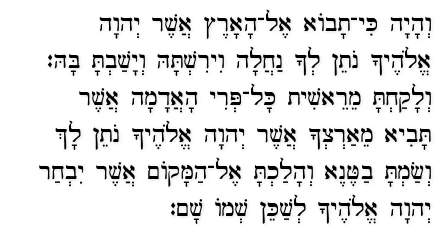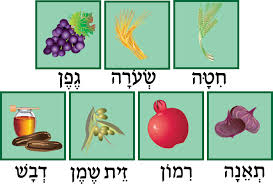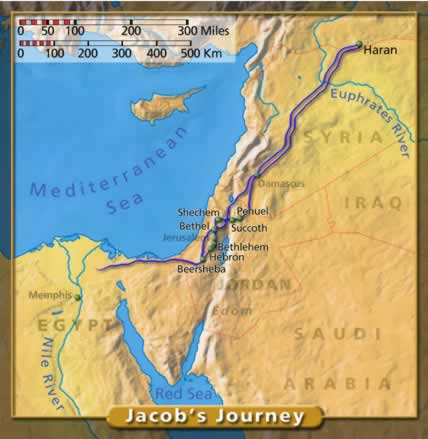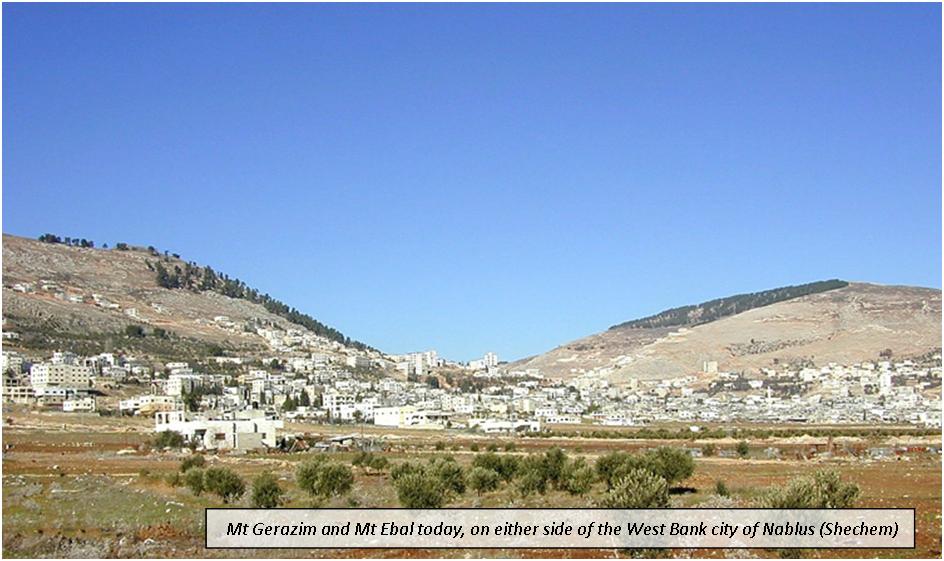כי תבוא
Parsha Ki Tavo
Debarim (Deuteronomy) 26:1-29:1
Debarim (Deuteronomy) 26:1“And it shall be, when you come into the land which YaHuWaH your Elohim is giving you as an inheritance, and you possess it and dwell in it,2 that you shall take some of the first of all the fruits of the soil which you bring from your land that YaHuWaH your Elohim is giving you, and shall put it in a basket and go to the place where YaHuWaH your Elohim chooses to make His Name dwell there.
The concept of bikkurim or firstfruits is a central theme in the entirety of scripture. In fact the very word for firstborn in Hebrew (Ivrit/Abryt) is bikkur, so the concept of the firstborn and firstfruit are one in the same revelation. כי תבוא Ki tavo means “when you come” referring to entering the Promised Land, this portion begins with instructions for Yisrael (Yashar’al) to present the first and best of their crops to YaHuWaH at the place where YaHuWaH chooses to make his Name dwell. The bikkurim or firstfruits of the shivat ha-minim or seven species of fruits include grapes, figs, pomegranates, olives, dates, wheat and barley. The best samples of the firstfruits are placed in elaborately decorated baskets, for the wealthy they would use baskets of gold and silver, for the poor, woven baskets normally from willow branches. Large processions of farmers and pilgrims would make their way to the House of YaHuWaH carrying their baskets oftentimes upon oxen, which would be offered in sacrifice. These harvests were brought from the time of Shavuot (Pentecost) in the spring until Sukkot (Tabernacles) in the fall.
Debarim (Deuteronomy) 26: 4“And the priest shall take the basket from your hand and place it before the altar of YaHuWaH your Elohim.5 “And you shall answer and say before YaHuWaH your Elohim, ‘My father was a perishing Aramean, and he went down to Mitsrayim and sojourned there with few men. And there he became a nation, great, mighty, and numerous.
A vow must be recited at the presenting of the bikkurim (firstfruits), involving a brief history of the patriarchs. As we see in the vow there is a statement claiming that “my father” (abi) was a perishing Aramean (Arami). This is due to Abraham’s lengthy stay in the land of Padan Aram but also due to Yitshaq’s marriage of Rebecca his relative who was also Aramean, as it is written “Rebecca the sister of Laban the Aramean.” Rebecca (Ribqah) later sent her son Ya’acob the patriarch, to stay with her brother Laban the Aramean for twenty years. Aram of ancient times is currently called “Syria.” Ya’acob married both Leah and Rachel who were subsequently Aramean. This is a further identifier of the ethnicity of Yisrael (Yashar’al), indeed they are Ibri (Abry) or Hebrew but in the same since they are ethnically related to and tied to the Aramean people by a genetic bond. After identifying Ya’acob as a perishing Arami who was persecuted by his uncle Laban the Arami, the account of Ya’acob going down to Mitsrayim (Egypt) and how his descendants were enslaved is also related verbally. The narrative of the great exodus from Mitsrayim is recited in summary form as part of this important declaration. At the end of the oath the one who brings his offering is to bow to YaHuWaH and give the offerings to the Kohan (Priest). In return the Kohan would wave the offering in the seven directions.
Debarim (Deuteronomy) 26:13then you shall say before YaHuWaH your Elohim, ‘I have put away the set-apart portion from my house, and also have given it to the Lewite, and to the stranger, and to the fatherless, and to the widow, according to all Your command which You have commanded me. I have not transgressed Your commands, nor have I forgotten.14‘I have not eaten any of it when in mourning, nor have I removed any of it for any unclean use, nor given any of it for the dead. I have obeyed the voice of YaHuWaH my Elohim, I have done according to all that You have commanded me.15‘Look from Your set-apart dwelling place, from the heavens, and bless Your people Yisra’el and the land which You have given us, as You swore to our fathers, “a land flowing with milk and honey.” ’
In the third year and the sixth year of ever Sabbath year, the Tithe of the increase of the field is given. This portion of tithing is to be shared with the Lewite first and foremost and also the widow, orphan and stranger. There are a variety of tithes that are collected but this portion focuses mostly on this type called Ma’aser Ani. The concept of tithing goes back to Abraham who gave a tenth of all to Malki Tsedek known as Melchizedek. All tithes were given freely, though it was “the law” of the land, the tithe was not enforced by the officers or judges, rather we see that the one who tithed would make his declaration to YaHuWaH himself. YaHuWaH would enforce the Berikah called “blessing” to those who gave and the curse upon those who defied his word!
Mosheh (Mushah) provides instructions to the people for when they enter the Promised Land. The first step that should be taken upon entering the Promised Land is to take twelve stones to plaster and engrave the commands of Torah upon them beautifully and legibly. This was obviously symbolic of the twelve tribes of Yisrael being sealed with the word of YaHuWaH. Mosheh (Mushah) directs Yisrael (Yashar’al) further that when they come into the land they are to proclaim the berikoth (blessings) and curses of the Torah as mentioned in the Torah Portion Re’eh. Six of the tribes were to stand on Mount Gerizim to confirm the Berikah (blessing) and the other six tribes were to stand on Mount Ebal and confirm the curses. The berikah (“blessing”) and the arar (“curse’) is then to be announced by the Kohanim of the tribe of Lewi. After each curse was recited the people would respond, “amein” meaning “let it be.” This same process was repeated after the announcing of the berikoth (“blessings”), the people would respond in agreement saying “amein” or let it be. The word “bless” is barak in Hebrew, which comes from the verb meaning to bend the knee, it literal implies gifting someone with favor. The word for curse is arar meaning to snare or to set aside for destruction or binding. This arar was first done to the serpent in the garden that is called in Hebrew the Nachash. The second to receive an arar was Qayin (Cain) who slayed his brother. The Arar is the curse in which the scriptures refer to as the “curse of the Torah.” Most who are willingly uneducated in scripture declare that the Torah itself is a curse, but we know this cannot be, for it is written that if we live by these commands “it shall be well with you”.
Those who experience the curse are those involved with idol worship, adultery, murder, bribery, disrespect towards parents, moving the boundary stones and many other related sins.
Debarim (Deuteronomy) 27: 26‘Cursed is he who does not establish the Words of this Torah.’ And all the people shall say, ‘Amen!’
However if we are obedient YaHuWaH clearly states:
Debarim (Deuteronomy) 28:1“And it shall be, if you diligently obey Elohim, to guard to do all His commands which I command you today, that YaHuWaH your Elohim shall set you high above all nations of the earth.2“And all these blessings shall come upon you and overtake you, if you obey the voice of YaHuWaH your Elohim
Not only will we be given a place high above all nations for obedience to YaHuWaH’s Torah but the berikoth (blessings) of YaHuWaH shall come upon us and “overtake us”, in other words we will be in complete surrender to the great and excellent benefits of YaHuWaH. The Torah says “baruch” (blessed) are you in the city and in the field, when you rise up, when you go in and when you go out. Obedience to Torah even causes the rain to fall. Your storehouses shall overflow and even your kneading bowl will have the berikah (“blessing”) of YaHuWaH upon it but most importantly even our children will experience this overtaking of YaHuWaH’s compassion and favor.
Debarim (Deuteronomy) 28:10 “And all peoples of the earth shall see that the Name of YaHuWaH is called upon you, and they shall be afraid of you.
( YaHuWaH’s name in “Paleo Hebrew”)
YaHuWaH’s name was integrated into the Name’s of Yisrael’s descendants. We see the short forms Yah and Yahu in many of the prophet’s names, such as Yahudah (Judah), EliYahuw (Elijah), YashaYahuw (Isaiah), YeremiYahuw (Jeremiah) and Yahuwshuwa (Joshua). In fact there are well over 100 names in the TaNaKh that contain the forms Yah and Yahu. However this also refers to the fact that Yisrael (Yashar’al) called on the Name of YaHuWaH openly and were to do so to perform the mitswah (command/connection) given in the Torah to qara meaning pronounce and proclaim the Name of YaHuWaH.
Debarim (Deuteronomy) 28: 15 “And it shall be, if you do not obey the voice of YaHuWaH your Elohim, to guard to do all His commands and His laws which I command you today, that all these curses shall come upon you and overtake you:
The Torah states that the curse will overtake us, this is a drastic contrast to being overtaken by compassion and favor. The one who breaks YaHuWaH’s covenant will be cursed in the field and in the city. He will be a byword and a proverb that will be sold into slavery. Disease, famine, tribulation and the sword are the rewards for disobedience. Even the agriculture will suffer from a person’s disobedience for it is written “your heavens which are over you shall be bronze” and “YaHuWaH makes the rain of your land “powder and dust.” Even the environment changes due to our sin.
Debarim (Deuteronomy) 28:45 “And all these curses shall come upon you, and they shall pursue and overtake you, until you are destroyed, because you did not obey the voice of YaHuWaH your Elohim, to guard His commands and His laws which He commanded you.46“And they shall be upon you for a sign and for a wonder, and on your seed, forever.
In this rebuke given by Mosheh (Mushah), he reveals the entire purpose of Torah:
Debarim (Deuteronomy) 28:58 “If you do not guard to do all the Words of this Torah that are written in this book, to fear this esteemed and awesome Name, YaHuWaH your Elohim,59then YaHuWaH shall bring upon you and your descendants extraordinary plagues, great and lasting plagues, and grievous and lasting sicknesses.
The purpose of our obedience to Torah is that we may be in awe of the esteemed and awesome Name of YaHuWaH!
Further Mosheh (Mushah) states that YaHuWaH will bring nations from afar which are strong and numerous who speak foreign languages to besiege his people in the case of their waywardness. These sieges would turn even the most tender man or woman into a cannibalistic beast who is stricken with madness.
Debarim (Deuteronomy) 29:64 “And YaHuWaH shall scatter you among all peoples, from one end of the earth to the other, and there you shall serve other mighty ones, which neither you nor your fathers have known, wood and stone.
We know this historically took place first to the northern ten tribes who were sent into captivity by the Assyrians. The northern tribes known as Ephraim and Yisrael have never returned to their land. This also took place to the southern tribes known collectively as the house of Yahuwdah (Judah) who were exiled twice, first by the Babylonians and then later by the Romans. The Romans also sold Yahudim to Mitsrayim (Egypt) and sent them their via slave ships fulfilling the words of the curse.
Debarim (Deuteronomy) 28:68“And YaHuWaH shall bring you back to Mitsrayim in ships, by a way of which I said to you, ‘You are never to see it again.’ And there you shall be sold to your enemies as male and female slaves, but no one to buy.”
There are a total of 98 curses listed in this particular section of Torah whereas the book of Wayyriqra (Leviticus) lists 49, which are exactly half. However these essentially are not all the curses which one can expect because YaHuWaH basically lets us know he will curse the one who is disobedient by any means he deems necessary. These curses are to act for as mechanism to bring about repentance in one’s life. The Torah portion ends on a positive note however.
Debarim (Deuteronomy) 29:9“Therefore you shall guard the words of this covenant, and do them, so that you prosper in all that you do.
Though Yisrael went through many calamities due to their unbelief and hard hearts their has always been a righteous remnant. When the curses overtook the house of Yahuwdah (Judah) and they were sent into Babylon (Babel), the righteous Daniel did not only thrive and prosper as a prophet of YaHuWaH in a pagan land but he was given favor by three distinct Sovereigns and by each of them he was made the second in command. This is a life lesson, we should not except our status as being cursed, even if our family, relatives, or the entire nation is suffering pain and loss. Through obedience to YaHuWaH we can receive compassion even in dark and terrible times. Let us learn to be like Daniel who overcame his circumstances and remained baruch (blessed) even in times of the curse. Through Messiah Yahuwshuwa we can overcome the curse of the Torah and walk in it’s berikoth (blessings)!






